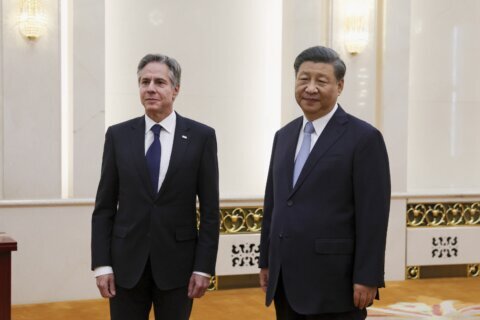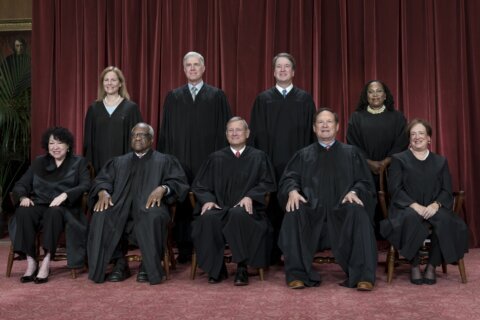WASHINGTON (AP) — During a private meeting in July, Sen. Joe Manchin and Majority Leader Chuck Schumer sat down to negotiate what exactly it would take for Democrats to unlock Manchin’s vote to start the process of considering President Joe Biden’s massive social and environmental bill.
What emerged was a one-page document, unformatted, where the West Virginia Democrat laid out his views. Both signed it, with reservations.
Nearly five months later, much of what Manchin wanted has been delivered. But fellow Democrats appear nowhere close to gaining the conservative senator’s support for their far-reaching domestic package. Having passed the House, the bill is now stalled in the Senate.
Here’s a look at what Manchin wanted then and where the legislation stands now.
TOPLINE DOLLARS
Manchin wrote in the document that he wanted a $1. 5 trillion topline — far less than the $3.5 trillion Biden proposed.
Biden halved the amount to $1.75 trillion when it became clear Manchin could accept that. The bill now tallies roughly $2 trillion.
STRATEGIC PAUSE
Manchin wanted to begin debate on the legislation no earlier than Oct. 1.
In a subsequent opinion piece he suggested a “strategic pause.”
That date has passed.
TAXES
Manchin insisted the corporate tax rate, which Biden proposed raising to 28%, not inch past 25%. In fact, it ended up not being raised at all, thanks to opposition from another hold-out Democrat, Sen. Kyrsten Sinema of Arizona.
Manchin also proposed a 15% corporate minimum rate, as is now included in the bill.
He wanted any excess revenue to go toward paying down debt, but that idea was never embraced by Democrats.
CLIMATE CHANGE
The coal-state senator insisted on a “fuel neutral” energy policy — essentially one that does not favor wind, solar and other renewable energy sources over fossil fuels, such as coal and natural gas.
Manchin insisted plans for a clean energy standard run through the Energy and Natural Resources Committee, which he chairs.
After Manchin objected, the White House scrapped plans for a nationwide clean energy standard that environmental advocates viewed as the most significant tool for curbing climate change.
The new incentives for renewable energy sources did not come with rollbacks on coal, oil or natural gas.
Just this week, Manchin, as chair of the energy panel, removed a Democratic proposal to permanently ban offshore drilling in the Atlantic and Pacific oceans. Environmentalists strongly opposed his move, and several Democrats said they would fight to restore the drilling ban, which gained new momentum following a catastrophic oil spill off California’s coast this fall.
Despite criticism by Manchin, Democrats remain on track to impose a fee on excess methane emissions from oil and gas wells.
SOCIAL POLICY
Much of Manchin’s public opposition to the size and scope of the package centers on its investment in landmark social programs — child tax credits, a new federal paid family leave program and lower-cost child care.
His reasoning? Well, Manchin has reiterated one phrase over these negotiations: “I don’t believe that we should turn our society into an entitlement society.”
The senator has been adamant about “no additional handouts,” as he wrote in his memo. He wants many of the social services programs “means tested” to apply only to those at lower-income thresholds.
As a result, the new paid family and medical leave program that Democrats overwhelmingly want could be gutted completely, dashing their hopes of taking the U.S. off the list of remaining countries without any form of national paid leave.
The most recent debate centers around extending the child tax credit, passed earlier this year as part of pandemic relief legislation. The program, a keystone of Democratic efforts to reduce child poverty, has been sending up to $300 per child directly into the bank accounts of families each month. The expansion, studies say, is expected to cut child poverty by 40% — with 9 of 10 American children benefiting.
Without action by Congress, the program will expire and this month’s checks will be the last ones.
Manchin now says he wants the child tax credit program extended for the full 10-year budget window, rather than just one year — a nonstarter since the price tag would consume most of Biden’s bill, crowding out other key initiatives on health care, child care, education and more.
“We’re not going to move all of the programs to 10 years. That’s not going to happen,” Rep. Pramila Jayapal, D-Wash., leader of the Congressional Progressive Caucus, told The Associated Press on Friday.
Jayapal said Manchin agreed to a framework for the bill in October, which spelled out the plan’s priorities and costs but didn’t limit the duration of any of them. Manchin, she predicted, will “hold to his commitment.”
___
Associated Press writers Alan Fram and Matthew Daly contributed.
Copyright © 2024 The Associated Press. All rights reserved. This material may not be published, broadcast, written or redistributed.







